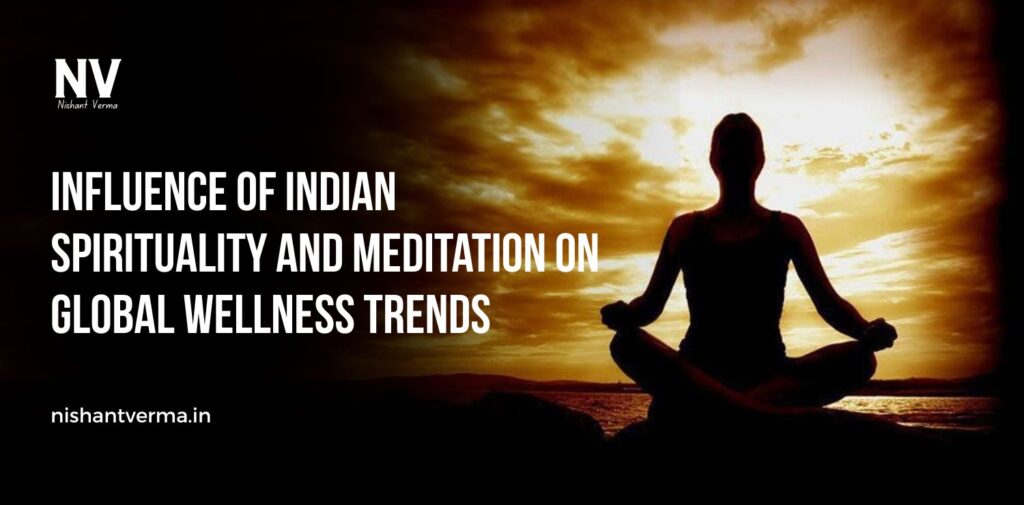Over the past few decades, there has been a noticeable shift in how people around the world approach health and wellness. From fitness routines to mental health practices, people are increasingly looking for ways to improve not just their physical health but also their mental and emotional well-being. One of the most significant sources of influence on these global wellness trends has come from Indian spirituality and meditation practices. These ancient traditions, which have been practiced for thousands of years in India, are now being embraced globally for their benefits in promoting a healthy, balanced lifestyle.
Understanding the Roots of Indian Spirituality and Meditation
Indian spirituality has deep roots in the country’s culture and history. At its core, Indian spirituality is about the connection between the self, the universe, and a higher power. It encompasses various philosophies, religions, and practices, including Hinduism, Buddhism, Jainism, and Sikhism. A central element of Indian spirituality is the belief in achieving inner peace, self-realization, and harmony with the universe.
Meditation, an important practice within Indian spiritual traditions, is a technique that involves focusing the mind to achieve a state of deep relaxation and mental clarity. The practice of meditation has been an essential part of Indian culture for centuries. It is mentioned in ancient texts such as the Vedas and Upanishads and is closely associated with practices like yoga, which also has its roots in India.
Today, meditation is no longer confined to spiritual or religious contexts but is widely regarded as a practice for improving mental and physical health. As people around the world search for more holistic ways to address stress, anxiety, and other health concerns, the ancient practices of Indian spirituality and meditation have gained global popularity.

The Global Rise of Yoga and Meditation
The global wellness trend has been significantly shaped by the spread of yoga and meditation, both of which have their origins in Indian spirituality. Yoga, a practice that involves physical postures, breathing exercises, and meditation, has become a mainstream activity in many countries. Whether it is practiced in a studio, at home, or in nature, yoga offers a way for people to improve their physical flexibility, strength, and mental focus.
Yoga’s influence on global wellness cannot be overstated. In countries like the United States, Canada, and Europe, yoga has grown from a niche activity into a multimillion-dollar industry, with millions of people practicing it regularly. This growth is driven by the numerous benefits yoga offers, including reducing stress, improving flexibility, increasing strength, and promoting overall well-being. As yoga continues to evolve and adapt to modern lifestyles, it also incorporates elements of meditation, breathing techniques, and mindfulness practices that have deep roots in Indian spirituality.
Similarly, meditation has gained widespread recognition as a powerful tool for improving mental health. Practices such as mindfulness meditation, guided meditation, and transcendental meditation have been adopted by individuals around the world to manage stress, reduce anxiety, and improve concentration. Meditation’s rise in popularity is a direct result of its association with Indian spiritual practices, which emphasize stillness, self-awareness, and the cultivation of inner peace.

Mindfulness and its Connection to Indian Practices
Mindfulness, the practice of paying attention to the present moment without judgment, has become a central focus of the global wellness movement. While mindfulness is often associated with Buddhism, a religion that originated in India, it is deeply influenced by the broader Indian spiritual tradition of meditation.
In India, mindfulness is not only a spiritual practice but also a way of life. It is an integral part of many spiritual paths, including the practice of Vipassana meditation, which is focused on cultivating awareness and understanding the nature of the mind. Mindfulness practices from Indian traditions encourage individuals to be fully present in their everyday activities, whether it’s eating, walking, or interacting with others.
Today, mindfulness has been embraced by people worldwide as a means of reducing stress, improving mental health, and fostering emotional resilience. It is used in various settings, from schools and workplaces to therapy sessions and wellness retreats. Research has shown that mindfulness can help lower blood pressure, reduce symptoms of depression, and enhance cognitive function, making it a valuable tool in the modern wellness toolkit.
Holistic Health and the Influence of Indian Traditions
Indian spirituality emphasizes the interconnectedness of the body, mind, and spirit. The concept of holistic health, which views health as the balance of physical, mental, and emotional well-being, is a key principle in Indian traditions. Ayurveda, the ancient system of medicine that originated in India, is an example of a holistic approach to health. Ayurveda focuses on balancing the body’s energies (called doshas) through diet, herbal remedies, yoga, meditation, and lifestyle changes.
This holistic approach to health has influenced modern wellness trends, which often emphasize the importance of treating the whole person rather than just addressing individual symptoms. Many wellness centers and spas around the world now offer Ayurvedic treatments, and there is growing interest in natural, plant-based healing practices inspired by Ayurveda.
The influence of Indian spirituality has also shaped the rise of other holistic wellness practices, such as the use of essential oils, mindfulness techniques, and energy healing practices. These practices often focus on restoring balance and harmony within the body and mind, promoting overall health and vitality.
Yoga and Meditation for Stress Relief and Mental Health
In today’s fast-paced world, stress and mental health issues have become increasingly common. People are looking for ways to manage their stress, improve their emotional well-being, and find inner peace. Indian spiritual practices, particularly yoga and meditation, offer powerful tools for achieving these goals.
Yoga’s combination of physical postures, breathing exercises, and mindfulness helps individuals release tension, improve circulation, and relax the mind. Regular yoga practice has been shown to reduce levels of cortisol, the hormone associated with stress, and increase the production of endorphins, which are the body’s natural mood elevators. This makes yoga an effective way to combat stress and improve mental health.
Meditation, on the other hand, provides a mental space for individuals to detach from the chaos of everyday life and focus on the present moment. Meditation techniques, such as deep breathing, visualization, and mantra repetition, help calm the mind and reduce anxiety. Many mental health professionals now recommend meditation as a complementary practice for treating anxiety, depression, and other mental health conditions.
In recent years, more people have turned to yoga and meditation as part of their mental health and wellness routine, finding peace and balance in their busy lives. These practices offer a natural, non-invasive way to improve mental well-being and create a sense of inner calm.

Spirituality in the Modern World: Bridging the Gap
One of the most remarkable aspects of the influence of Indian spirituality and meditation on global wellness trends is how these ancient practices have adapted to modern lifestyles. Today, people are increasingly interested in spirituality and wellness, but they often seek a more personalized and secular approach to these practices.
Indian spirituality, with its emphasis on inner peace, self-awareness, and balance, offers a framework for living a mindful and purposeful life. At the same time, yoga, meditation, and other spiritual practices have evolved to meet the needs of a modern, global audience. Whether it’s through online yoga classes, meditation apps, or wellness retreats, people now have more access than ever to these transformative practices.
Incorporating elements of spirituality into daily life doesn’t necessarily require religious commitment. For many, it’s about embracing the principles of mindfulness, meditation, and self-awareness to cultivate a deeper sense of well-being. This approach to spirituality allows individuals from all backgrounds to connect with the transformative power of Indian practices without feeling disconnected from their own beliefs or traditions.
Conclusion: The Enduring Influence of Indian Spirituality
The influence of Indian spirituality and meditation on global wellness trends is undeniable. As more people seek to improve their mental, emotional, and physical well-being, the ancient practices of yoga, meditation, and mindfulness continue to provide valuable tools for navigating the challenges of modern life. These practices not only promote personal health but also foster a greater sense of connectedness to others and the world around us.
By embracing the wisdom of Indian spiritual traditions, people are discovering new ways to achieve balance, inner peace, and overall wellness. As the world becomes more interconnected, the enduring influence of Indian spirituality will continue to shape global wellness trends, guiding individuals on their journey towards a healthier, more mindful, and fulfilling life.




